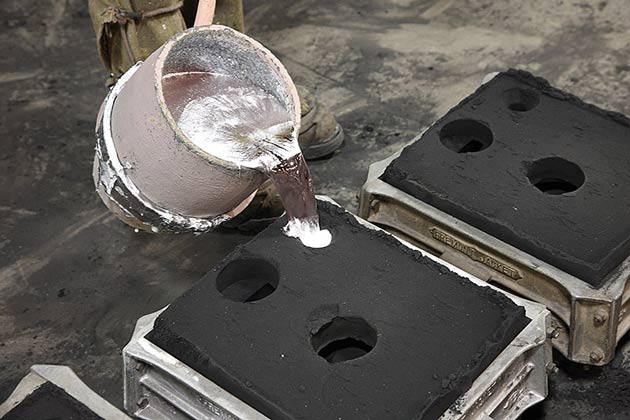Alcast Company Fundamentals Explained
Alcast Company Fundamentals Explained
Blog Article
Top Guidelines Of Alcast Company
Table of ContentsThe smart Trick of Alcast Company That Nobody is DiscussingGetting The Alcast Company To Work6 Simple Techniques For Alcast CompanyAll about Alcast CompanyAlcast Company Things To Know Before You BuyExamine This Report about Alcast Company
The subtle difference hinges on the chemical content. Chemical Contrast of Cast Aluminum Alloys Silicon promotes castability by decreasing the alloy's melting temperature level and enhancing fluidness throughout spreading. It plays an important role in enabling intricate mold and mildews to be loaded precisely. Furthermore, silicon adds to the alloy's stamina and use resistance, making it valuable in applications where resilience is vital, such as auto components and engine elements.It also boosts the machinability of the alloy, making it much easier to refine into ended up items. In this means, iron adds to the total workability of aluminum alloys.
Manganese adds to the stamina of aluminum alloys and enhances workability (aluminum foundry). It is generally made use of in functioned light weight aluminum items like sheets, extrusions, and profiles. The visibility of manganese aids in the alloy's formability and resistance to breaking throughout fabrication procedures. Magnesium is a light-weight aspect that supplies toughness and influence resistance to light weight aluminum alloys.
The 7-Minute Rule for Alcast Company
Zinc enhances the castability of light weight aluminum alloys and helps control the solidification process throughout casting. It enhances the alloy's strength and firmness.

The key thermal conductivity, tensile stamina, yield stamina, and prolongation vary. Select suitable raw materials according to the performance of the target item created. Among the above alloys, A356 has the highest possible thermal conductivity, and A380 and ADC12 have the least expensive. The tensile limitation is the contrary. A360 has the very best yield stamina and the highest elongation rate.
10 Easy Facts About Alcast Company Described

In precision casting, 6063 is appropriate for applications where elaborate geometries and top notch surface finishes are paramount. Instances consist of telecommunication enclosures, where the alloy's exceptional formability enables sleek and visually pleasing layouts while preserving structural stability. In the Lighting Solutions industry, precision-cast 6063 components develop stylish and effective lights components that call for elaborate shapes and excellent thermal performance.
The A360 exhibits premium elongation, making it you can look here optimal for complex and thin-walled components. In precision spreading applications, A360 is fit for markets such as Consumer Electronics, Telecommunication, and Power Tools.
What Does Alcast Company Do?
Its unique homes make A360 an important selection for precision casting in these industries, boosting item toughness and quality. Aluminum alloy 380, or A380, is an extensively used spreading alloy with a number of distinctive qualities. It provides exceptional castability, making it an optimal option for precision spreading. A380 shows good fluidity when molten, making certain detailed and comprehensive mold and mildews are accurately recreated.
In precision casting, aluminum 413 beams in the Customer Electronics and Power Equipment industries. It's generally used to craft elaborate parts like mobile phone housings, camera bodies, and power device coverings. Its precision is exceptional, with tight resistances approximately 0.01 mm, making certain remarkable item setting up. This alloy's exceptional corrosion resistance makes it an outstanding option for exterior applications, making sure long-lasting, durable products in the mentioned industries.
The Only Guide for Alcast Company
As soon as you have determined that the aluminum die casting procedure appropriates for your project, a crucial next action is picking the most suitable alloy. The light weight aluminum alloy you choose will considerably impact both the casting process and the residential properties of the end product. Since of this, you must make your choice meticulously and take an informed method.
Determining one of the most ideal light weight aluminum alloy for your application will certainly suggest considering a broad variety of features. These relative alloy features adhere to the North American Die Casting Association's guidelines, and we've split them into two categories. The first category addresses alloy characteristics that influence the production procedure. The second covers qualities impacting the homes of the end product.
The Facts About Alcast Company Revealed
The alloy you select for die casting straight influences a number of facets of the casting procedure, like how simple the alloy is to deal with and if it is susceptible to casting issues. Hot fracturing, also recognized as solidification cracking, is a regular die casting flaw for aluminum alloys that can lead to inner or surface-level tears or fractures.
Certain aluminum alloys are much more prone to warm cracking than others, and your selection ought to consider this. It can damage both the cast and the die, so you must look for alloys with high anti-soldering properties.
Corrosion resistance, which is already a significant feature of light weight aluminum, can differ considerably from alloy to alloy and is a necessary particular to take into consideration relying on the ecological problems your item will certainly be revealed to (Foundry). Wear resistance is another residential property generally looked for in light weight aluminum products and can distinguish some alloys
Report this page